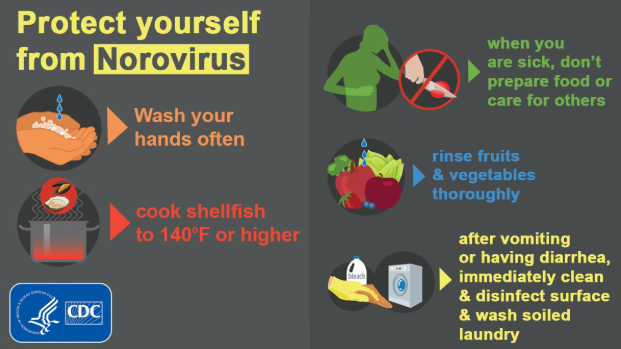From this article: https://www.cnn.com/2024/12/31/health/norovirus-cases-increase-wellness
CNN: What exactly is norovirus?
Dr. Leana Wen: Norovirus is the leading cause of foodborne illness in the US. According to the CDC, it is responsible for 19 million to 21 million illnesses every year. It results in over 2.2 million outpatient medical visits, 465,000 emergency department visits and 109,000 hospitalizations.
Also sometimes called the Norwalk virus or winter vomiting bug, norovirus is an extremely contagious virus. It is a common cause of illness outbreaks on cruise ships, where more than 90% of diarrheal illnesses are attributed to this virus. It also causes outbreaks in schools, day care centers, jails and other settings where individuals come into proximity with others.
CNN: How is norovirus spread?
Wen: Norovirus can be spread through direct contact with an infected person or through contaminated surfaces. If you share food or drink or utensils with an infected person, you could pick up the virus. You could also contract it by touching a surface that an infected person touched and then touching your mouth. In addition, the virus could be transmitted through tiny drops of vomit or fecal material that splatter onto surfaces.
CNN: What symptoms should people expect and for how long?
Wen: Symptoms of norovirus include nausea, vomiting, diarrhea and stomach cramps. Some people may also experience fatigue, low-grade fever, chills, headaches and muscle aches.
It’s common for people to go from feeling well to suddenly having gastrointestinal symptoms. These symptoms can be unnerving and unpleasant.
The good news is that most people improve within one to two days and recover completely, with no long-term health effects. There are, though, some people who become severely ill from norovirus, usually because they are unable to keep down fluids and become very dehydrated.
CNN: What should people do if they think they may have it?
Wen: There is no specific treatment for norovirus. As this is a virus, antibiotics that target bacteria won’t work. There is no directed antiviral against the norovirus, nor is there an approved vaccine to prevent it.
Most people will recover without medical intervention. The key is to try to keep down fluids to prevent dehydration, which can be a common side effect. Adults should drink water and most other fluids, including juice and sports drinks. Children can benefit from Pedialyte and other similar electrolyte solutions that are specifically formulated for kids with vomiting and diarrhea. Nursing moms should continue breastfeeding, even if they or their kids are experiencing gastrointestinal symptoms.





